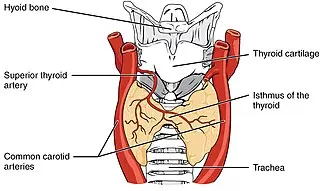The thyroid is a vital endocrine gland located in the lower front of the neck, just below the Adam’s apple. Shaped like a butterfly with two lobes connected by a thin isthmus, the thyroid plays a central role in regulating metabolism, energy production, and overall hormonal balance throughout the body. It produces and secretes two major hormones: thyroxine (T4) and triiodothyronine (T3), which are responsible for controlling the body’s metabolic rate, heart function, digestive activity, muscle control, brain development, and bone maintenance. The production of T3 and T4 is tightly regulated by the hypothalamic-pituitary-thyroid (HPT) axis, with thyroid-stimulating hormone (TSH) from the pituitary gland acting as the primary regulator. Iodine, an essential trace element obtained through the diet, is required for the synthesis of these hormones. Disorders of the thyroid are common and can range from hypothyroidism (underactive thyroid) and hyperthyroidism (overactive thyroid) to structural abnormalities like goiter and thyroid nodules. Autoimmune diseases such as Hashimoto’s thyroiditis and Graves’ disease are among the most prevalent causes of thyroid dysfunction, leading to chronic inflammation or overstimulation of the gland. In addition, thyroid cancer, including papillary, follicular, medullary, and anaplastic types, can arise from various cell types within the gland and is diagnosed using a combination of hormone testing, imaging, and histopathological evaluation. Clinical assessment of thyroid function typically involves measuring serum levels of TSH, free T4, and sometimes T3, along with testing for thyroid autoantibodies like anti-thyroglobulin (Tg) and anti-thyroid peroxidase (TPO). The thyroid is also a key focus of biomedical research due to its complex immunological interactions and the systemic effects of its hormones. Understanding the molecular and cellular biology of the thyroid is essential not only for diagnosing endocrine disorders but also for developing targeted therapies, especially in the context of autoimmune disease and thyroid malignancy. As such, the thyroid gland remains a crucial component of both clinical endocrinology and translational medical research.
